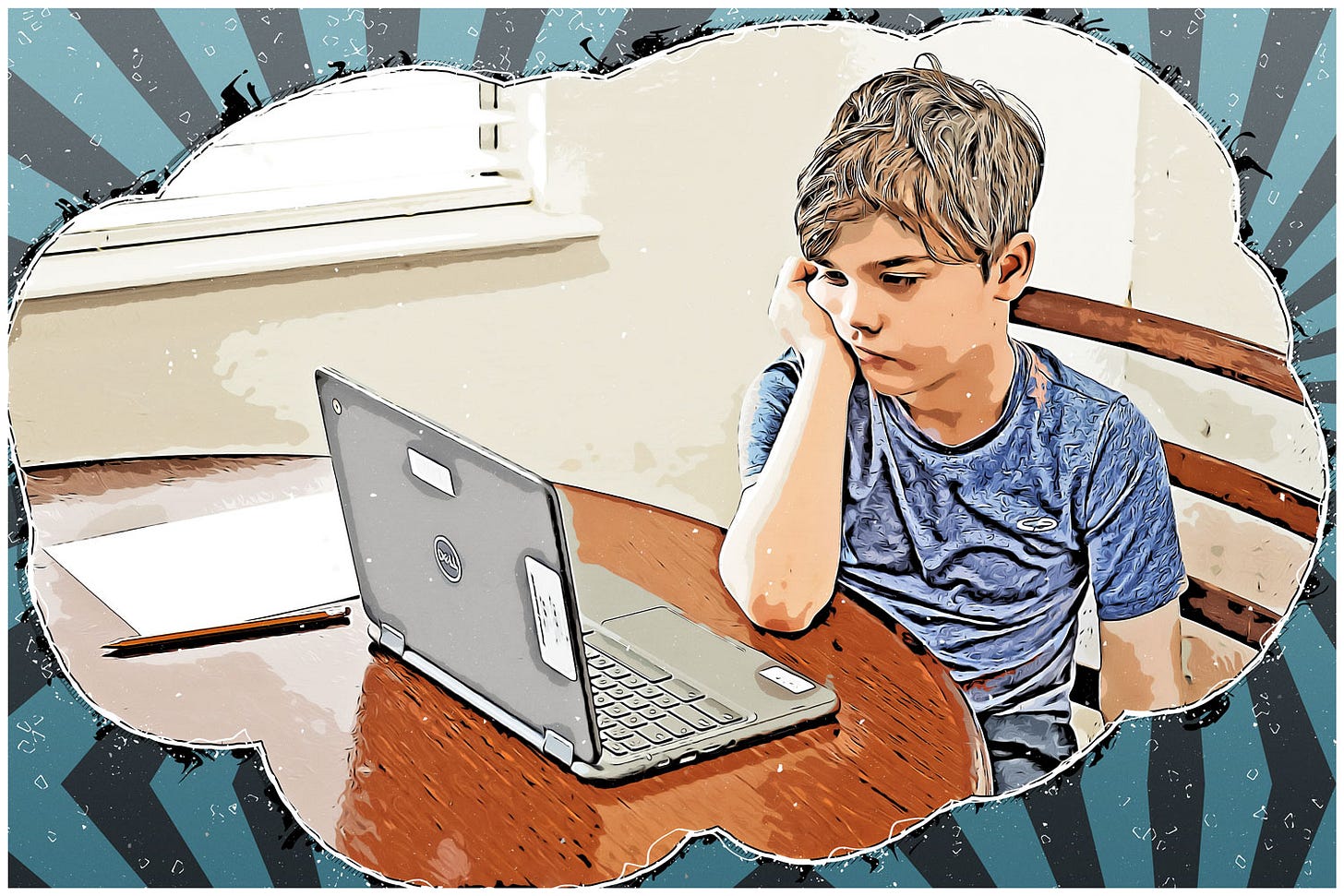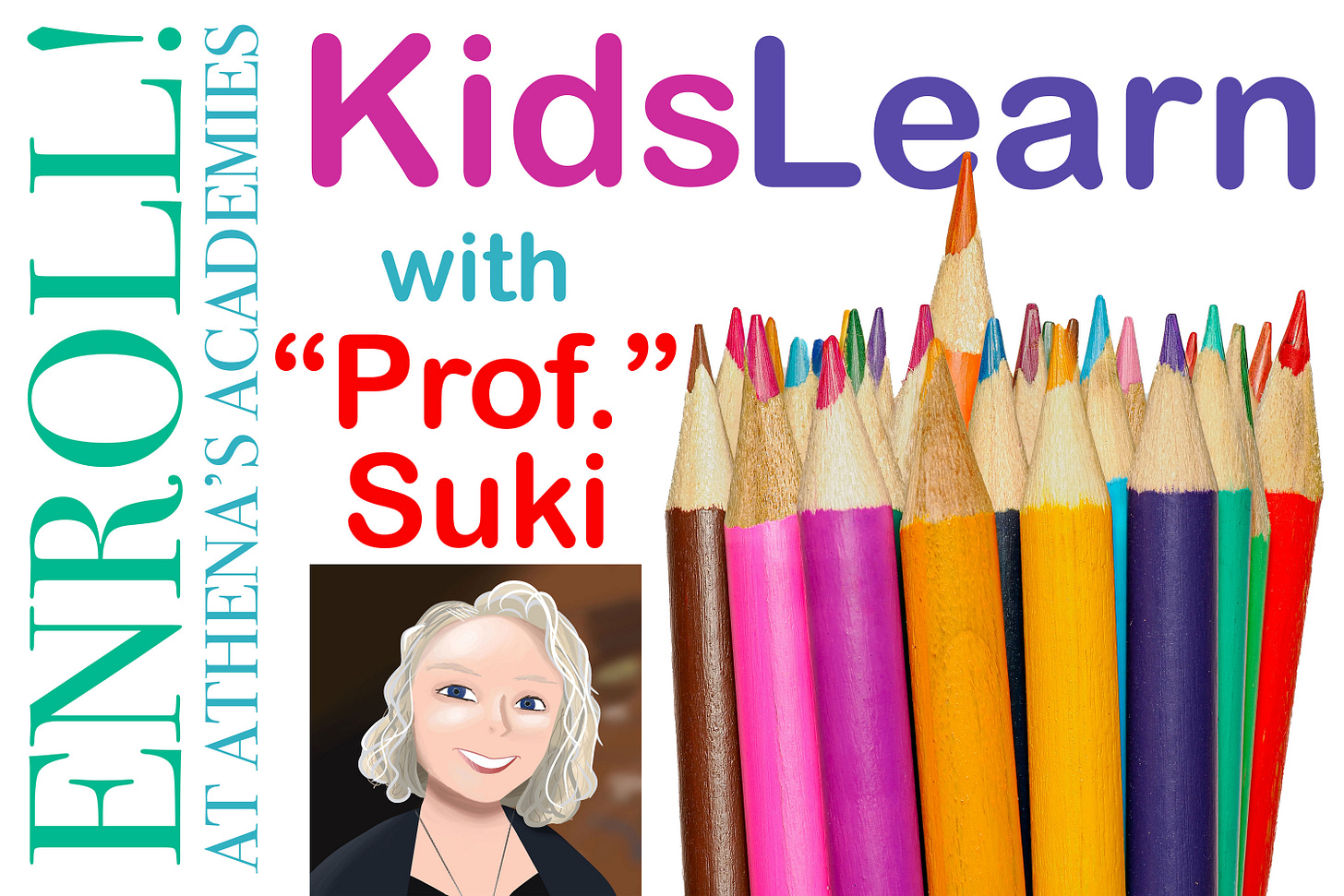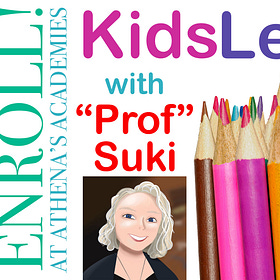Please bear with me as I talk about...
...the education "business"
The KidsLearn Substack is written by Suki Wessling, known as “Prof.” Suki to her students. Scroll to the bottom for links to Suki’s work and more information.
Hello Parents and Teachers,
The education “business” isn’t a topic I spend much time thinking about. As a teacher and a creative person, thinking about business strategy is not at the top of my fun stuff list. But lately I’ve been thinking a lot about where the business of online teaching has gone and why. I think this might be enlightening for you parents reading here, and I’d love to hear from other teachers about this topic.
Why online education? Why not?
I figured that I’d written on this topic many times on my old Avant Parenting blog, but I went and looked and… I hadn’t. I did write about what makes a good online course, structuring online learning for physical and emotional well-being, and tips for teachers suddenly forced into online teaching during the pandemic.
Before the pandemic, I never felt a need to justify that online learning had its place in the wide variety of options. Now, my analysis is that online learning has suffered blowback from three directions:
Online learning fatigue
An explosion of low-quality courses
An economic rebalancing
Online learning fatigue
I know you probably think that talking about the pandemic is so 2021, but the fact is, I can still hear its echoes reverberating around the education world. During the pandemic, most students were forced into online learning, and not surprisingly, it didn’t work for them. There are a lot of reasons for this, but foremost is the way that they accessed online learning:
They started online during a crisis
They learned with teachers who were also in crisis and not trained for this mode of teaching
They were expected to learn in the same way that they did in school
Online learning fatigue has led parents to post in parenting groups like this: “We’re looking for math - NO ONLINE CLASSES - for my 8-year-old. She likes…”
It was the Dark Ages of Education: When kids were expected to sit still in front of a camera for six hours a day. When teachers thought that they could simply move ahead with in-person curriculum as if it would work the same. When traumatized parents were trying to get their own work done as their kid was whining, I’m booooooooored!
The dark ages are over, but the parent population has not moved on. Whether they experienced the trauma at the time, or they are parents with younger children whose friends have warned them off online learning, parents seem to be suffering from post-Covid PTSD. I can talk all day long about how my classes are different, but the trauma-voice yelling NO ONLINE CLASSES drowns me out.
An explosion of low-quality courses
Another thing that happened during the pandemic was wholesale training of teachers to teach in online environments. This is wonderful! Now when there’s a disaster or a measles outbreak1 or a snow day, teachers can move to online instruction smoothly and quickly.
However, it’s also led to a plethora of teachers thinking that they can make a little spare cash by teaching online. They have been attracted by Amazon-like platforms which provide them with everything they need to offer classes… except for the understanding of what makes a great online course for kids.
It’s also led to public charter schools that serve homeschoolers, the bread and butter of the online community where I teach, to offer their own, in-house, free classes. Again, teachers with little or no training in what makes online learning fun, inspiring, and successful lead families to an even lower opinion of what online learning is and can be.2

An economic rebalancing
I’m questioning my use of the word “balance” here. Our economy is not balanced. Our economy is like those top-heavy SUVs that used to go skidding off curves because they were designed to be impressively tall, without any attention paid to the fact that it’s the weight at the bottom that keeps the car stable.
Our economy only works when there are plenty of dollars at the bottom and in the middle. Working families spend money; wealthy families hoard it. This is not only a provable fact, but just basic common sense. If you are living on the edge and you suddenly get a raise of $100 per month, you’ll immediately start spending that money on things that you need. A wealthy person who gets $100 more per month? They won’t notice it and won’t change their behavior in response to it. No matter whose politics you agree with, that’s a fact borne out by numbers.
And right now, our economy is in the sort of crisis a lot of people don’t see until they’re on the other side of it. If you’re a homeschooling family (which many of my families are), you’re already functioning with one parent earning less than they would (or in some cases, nothing). Add that to our lopsided economy, and you see families starting to cut nonessentials. And online classes? See all the reason above why they might now be seen as nonessential.
I’m a fish hanging out in a downstream still pool
Before Covid, I had to get a “secret enrollment link” for my students before general enrollment opened so they could pre-enroll. If I didn’t, my passionate families would be knocked out of their spots by new parents who were quicker on the enrollment trigger! My courses were that popular, and for good reason. I was trained by Dr. Kirsten Stein at Athena’s Advanced Academy, and she knows online learning. With her support I developed classes that worked for my students and worked for me. They are fun and interactive. My students don’t have to stare at a screen for six hours a day—live classes are only as long as they need to be. Students interact with me via forums all week long. They connect with each other socially and academically outside of class on our platform. I didn’t know at the time that I was working in a temporary paradise, a feeding frenzy of online fun, interaction, and connection.
Now, I’m a lonely fish in still water, swimming around, trying to make my own commotion. I work hard for each student who comes into my classes, often after working to convince families that online education is worth taking a chance on. I offer scholarships even though my take-home pay is already well below what I (and all teachers) deserve. And yet…
The online education business is still here for you and your kids
I’ll end with an anecdote about my younger child, the one who inspired my Avant Parenting blog all those years ago. This was a kid who couldn’t handle kindergarten, so we homeschooled. He couldn’t be in a room with other kids without acting out physically, like a switch got flipped in his brain and all of a sudden his body went wild. His joy was beyond beautiful; his frustration was volcanic.3
When he was in third grade, our fourth year of homeschooling, he asked if we could study mythology. I was tired that day and I thought, I don’t want to study mythology! But then I remembered that there was this online course at a place called Athena’s.
My kid had his first successful learning experience with Dr. Kirsten at Athena’s. Because there were no other bodies in the room with him, he could focus on the learning. He raised his little digital hand and offered up theories about Zeus and Mercury. He was so happy at the end of class because he was successful: he had spent 50 minutes with a group of kids who shared their passion for a subject that they might never have discovered in school, with a teacher who bubbled with infectious enthusiasm.4
I’m not the only teacher out there who is worthy of your notice, I’m just the one writing this essay. Out there you can find Latin and Chinese, entomology and etymology, math fun and serious literature, Dr. Who and Hamilton, physics and marine biology, music and screenwriting.
Athena's Fall Semester Open for Enrollment
This fall I'm offering Writer's Lab (all ages), Teen Writer's Lab (13+), and Etymology (History of the English Language). Please spread the word about the great classes at Athena's!
This is what online learning can be.
It can be life-changing. It can be simply useful. It can be exactly the hour your child needs to spend. It can be a bridge to their real life learning. It can be the place where they make friends for life. But you have to try it to know if you like it. Check out what my fellow teachers and I have to offer.
I’d love to hear your take on this!

I feel so 1962 having to type that!
I don’t have room in the body of this essay to go into this topic, but please be assured that not only do I have wonderful friends who teach for these charters, but I know that many of the teachers who teach for these charters offer great classes. The thing is, because they are often forced (with no extra pay) to offer these classes, they aren’t motivated the way that inspired online teachers are. The fact that the states are starting to mandate “face-to-face” teacher/student time means that more of these courses are being forced on teachers who don’t like them and families who don’t want them.
Once I’ve told a version of this story, I always like to offer the light at the end of the tunnel: He’s now a happy adult getting a PhD in chemistry. If you have a difficult child, please know that there is an adult at the end of that long road. Today is hard, for sure, but work toward the future that you want for your child.
As a humorous aside, this same kid ended up being a senior in high school then a freshman in college when Covid hit. He now hates online courses! So, I guess you could say I truly understand that particular PTSD.









Online education has really changed so much in such a short period of time--this is such a great consolidation of everything that's happened over the last few years! :)